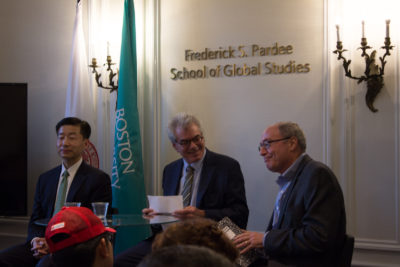
The growing tension between the United States, North Korea and other East Asian countries — and ways to resolve the conflict — were discussed on Tuesday evening at a panel discussion hosted by Boston University’s Center for the Study of Asia.
Throughout the discussion, titled “Showdown on the Korean Peninsula: The United States, China and the Two Koreas,” the speakers presented their perspectives on the crisis to around 100 audience members at the Frederick S. Pardee School of Global Studies. Some points of discussion included the likelihood of military conflict occurring, the effects of a nuclear North Korea on the rest of the world and potential solutions to the crisis.
Thomas Berger, a Pardee professor, moderated the discussion and said he hoped it would give members of the BU community a better understanding of the dilemma and what it might mean for the United States and East Asia.
“It’s at the top of the list of policy agenda. We thought it would be an interesting thing for the larger BU community to hear some in-depth expert opinions on,” Berger said.
Berger said he thinks the North Korean nuclear crisis is an important issue, as the consequences of a military conflict with the East Asian nation could be severe.
“There is a very real possibility that the United States could find itself in the bloodiest war since 1945,” Berger said. “I don’t think that possibility is very high, but it is quite possible, and therefore, I think it’s a very important subject.”
Gary Samore, the executive director for research at the Belfer Center for Science and International Affairs at Harvard Kennedy School, spoke during the discussion about his opinion about the conflict. Samore served as former President Barack Obama’s White House Coordinator for Arms Control and Weapons of Mass Destruction for four years. Given his experience, he said he thinks many of the United State’s attempts at diplomacy with North Korea have been failures.
“We’ve tried a wide range of things to stop North Korea from building nuclear weapons,” Samore said. “All of those deals, where we gave North Korea something … in accordance to getting North Korea [to agree] to limit its nuclear weapons – all of those deals collapsed.”
Sung-Yoon Lee, a professor of Korean studies at Tufts University, said during the panel that he believes North Korea must be taken more seriously as a threat to the United States.
“We tend to look down on North Korea,” Lee said. “We tend to patronize North Korea [and] we tend to mock North Korea. I think if we are more civil and stop calling [North Korea] names and are a bit nicer … maybe they’ll stop making threats.”
Several audience members said they found the discussion informative and said they felt that it gave them a better understanding of the conflict.
Daniel Zheng, a College of Arts and Sciences junior, said the panel helped him better understand China’s role in the North Korean nuclear issue.
“I have a [clearer] understanding about China’s position in the North Korean nuclear crisis,” Zheng said, “about China’s government’s concerns about the collapse of the nuclear regime and the worries about China’s own stability and security.”
Yuxi Huang, a first-year graduate student in Pardee, said she felt the experts on the panel were very knowledgeable and helped her understand the relations between the United States, China and North Korea.
“I can tell they are really experts on the subject,” Huang said. “I learned quite a lot from their talk.”
Si Qoi, a first-year graduate student in Pardee said she thought the opinions of the experts on the panel will help her in her studies of international relations.
“This is my first year learning about international relations, so I need a lot of knowledge to [succeed] in this field,” Qoi said. “I think to listen to such … professionals in this field will help me to understand international relations and to solve some problems in the future.”





















































































































